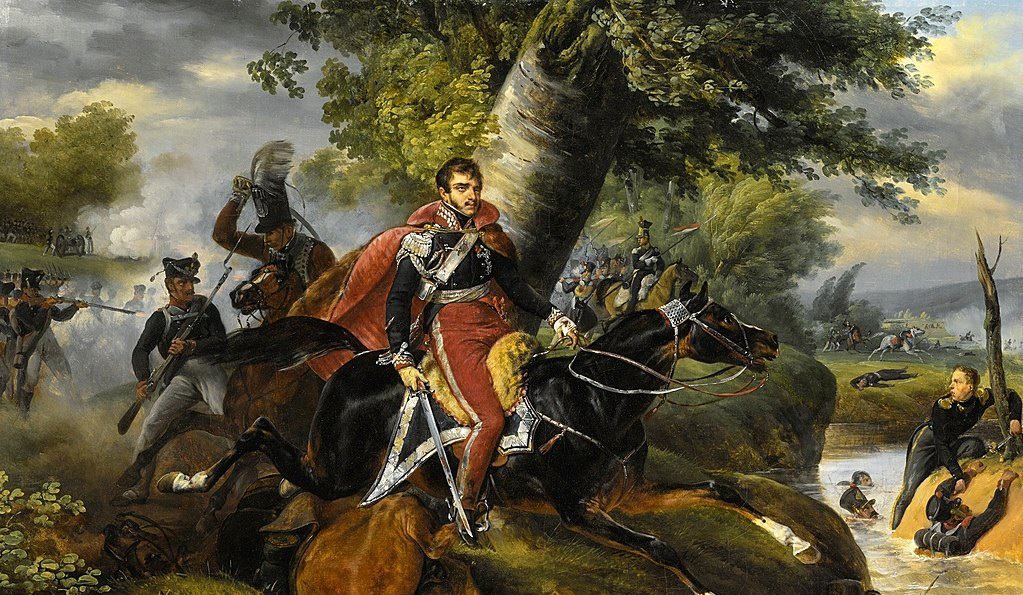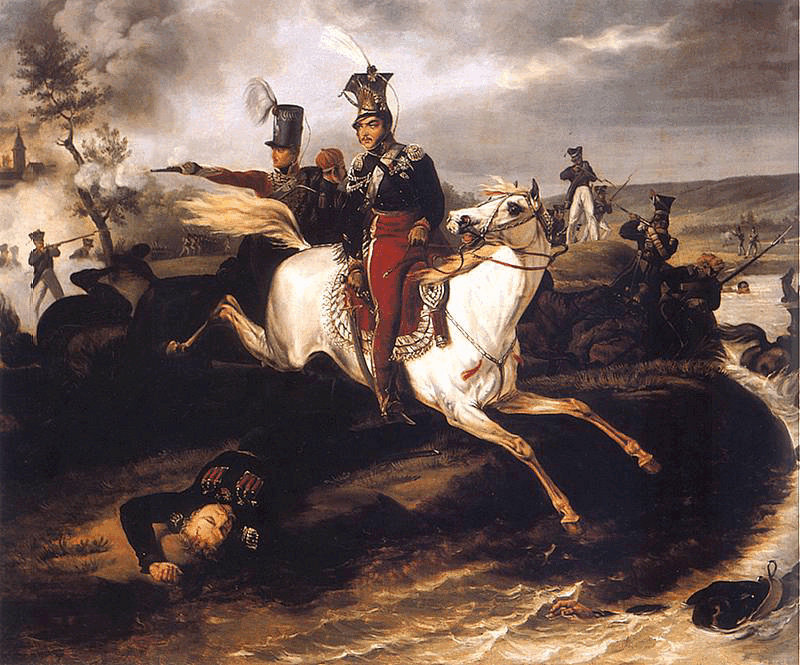|
I have been gathering ideas for a Sharp Practice scenario of the last moments of Prince Józef Poniatowski, Commander in Chief of the army of the Duchy of Warsaw, who died on the last day of the battle of Leipzig in October 1813. I found two accounts in Polish, one by Mariusz Lukasiewicz in his book “Armia Ksiecia Jozefa, 1813” and the other in “Lipsk”, by Jadwiga Nadzieja. Both accounts drew on eye witness reports and are almost identical. The following is a translation of the account in Lukasiewicz, with a small comment from Nadzieja’s book. Introduction: On 19 October 1813, Napoleon’s army was retreating westwards from Leipzig, covered by a rearguard including Poniatowski’s Polish VIII Corps. The army had only one route out of the city and while the details are still disputed, the single bridge over which the troops were retreating was blown up prematurely, leaving several thousand troops of the rearguard on the far side, including the Poles. With the bridge gone, the only way the stranded troops could avoid death or capture was to cross two rivers, the Pleisse and then the Elster, either on makeshift bridges or by swimming. Meanwhile, Russian and Prussian skirmishers were racing to cut them off. “Poniatowski retreated from the water fountain, together with his headquarters staff and remaining soldiers. They moved through the Reichel‘s garden and the Rudolf garden towards the river Pleisse under fire from approaching enemy skirmishers. The cuirassiers and some chasseurs were still fighting. General Bronikowski strongly urged the commander-in-chief to swim his horse across the Pleisse. Poniatowski was reluctant to withdraw, but eventually ordered his escort to gain time with one more charge and then jumped into the river. The Pleisse was deep and fast moving due to the autumn rains and Poniatowski’s horse couldn’t make it up the far bank. Seeing him in trouble Hypolite Blechamps, a young French captain on the Headquarters staff, ran to help. (Jadwiga Nadzieja says he was assisted by another aide, Ludwig Kicki, who was shot soon after dragging Poniatowski to the bank). He freed Poniatowski from his horse and pulled him onto the riverbank. The prince now proceeded for a time on foot. As he retreated through the gardens he was wounded for a fourth time, this time by a musket ball in his side. The wound was serious and only quick attention stopped him from bleeding to death. Poniatowski fell unconscious into the arms of his escort but soon regained his senses. His staff begged him to hand over command to one of his generals and surrender to the Allies so his wounds could be properly treated. Now half-conscious, Poniatowski refused, saying that his honour and duty to his Fatherland would not permit him to do this. With the help of his adjutants, he mounted another horse and supported from both sides, rode along the River Elster towards a crossing place that had been indicated by an officer of engineers. Allied troops had by now already reached the river and some had even crossed to the other side, shooting at the soldiers as they tried to swim to safety. Bleeding heavily and losing consciousness every few moments Poniatowski’s path was suddenly blocked by an enemy detachment and he turned his horse and jumped in the river. The horse managed with difficulty to reach the far bank, but as it scrambled to get out of the water, Poniatowski was hit again by a musket ball. He slid off the horse into the water and began to drown. Captain Blechamps again jumped in to help him, but soon they both disappeared in the current and neither was seen alive again. Poniatowski’s corpse was recovered from the Elster by a local fisherman on 24 October and his identity confirmed by Polish prisoners.”
0 Comments
Leave a Reply. |
Archives
November 2023
Categories
All
|


 RSS Feed
RSS Feed